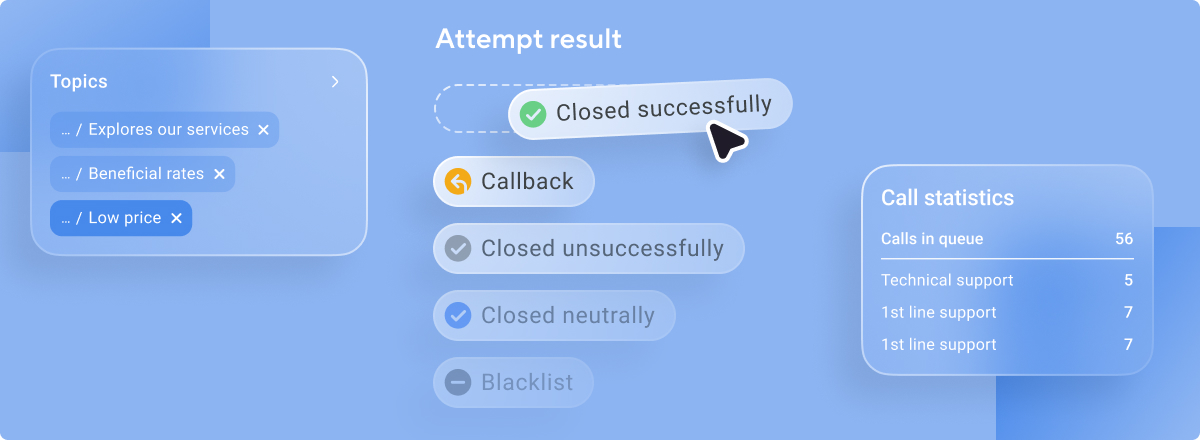When a customer contacts customer service, it's often because they have a pressing issue. While the level of stress experienced by the client will vary, such interactions are typically stressful.
Client support should be proficient in multitasking because of the many responsibilities in the workplace. Yet the primary one remains customer service. Varying techniques exist in optimizing customer support responsibility, yet one component always remains intact: empathy towards the client. For businesses aiming to streamline processes and scale efficiently, leveraging automation in areas like web development and user engagement can provide significant advantages. Explore strategies for How to scale your business with automation to enhance service delivery while maintaining a human touch.
What Is Meant by “Empathy” in Customer Service?
The notion of empathy in the work of a customer service manager is the same as it is in daily life — an ability to understand the feelings of others and be compassionate about them. Brene Brown has once stated that empathy means feeling with people — a metaphor that hits the target. Empathy means compromising, having tolerance, understanding, and flexibility to provide the necessary moral and physical backup for the other individuals.
Do Understand the Necessity of Emphatic Behaviour in Customer Service
Since the concept of empathizing with your client is closely related to the empathy we use in daily life, the function of this ability to understand the pains and joys of other individuals is similar in both contexts. A stronger personal link with those who seek your service establishes a solid connection, which increases the quality of the product offered to a client.
The experience of higher empathy can make the businesses capable of reaping three major benefits when coming from theory to practice:
- Increasing the level of customer satisfaction. It's always pleasant when your support specialist listens and gives timely advice to the clients and grasps the pressing issue; this way, the client's request is processed more effectively. Clients tend to give more detailed information and support staff experiences shorter cycles of solving the problem without having it delivered to the other agents or asking for advice. Empathy helps to avoid these inefficiencies, improving customer service in the first place.
- Quicker solutions. The client’s problem is solved faster because of the employees’ motivation to work and deliver high-end service. A worker is not then required to do background checks with the other employees or ask for advice, thus striking right on point. This doesn’t mean that a worker underperforms; empathy is about revealing the hidden core of the process. Empathic behavior of the agents throughout the cycle of client management is creative with finding answers and dealing with various issues.
- Positive brand image. Offering incredible service to satisfy the client is undoubtedly one of the decisive factors in driving client product usage. Customer service workers who have greater empathy are proactive in dealing with clients. As long as the majority of your clients remain positive when dealing with your business, the reputation you have built for your brand increases. When those who interact have a positive impression about your business, you'll solely have the advantage on the market.
Articulating Empathy When Providing People Service
You can stick to the principles below to demonstrate emphatic behavior towards your clients:
- Understand Their Problem. When the employee demonstrates accepting behavior, they show that they understand the topic the client has been bothered with. Rephrasing the problem back to the client reassures them they've been heard. In case you've missed something, simply ask again. Engaging in dialogue with a client means being fully present, empathetic and always ready to communicate.
- Remain Clear. When someone is having a problem, clarity is your best policy. Providing clarity to the client will help you earn their trust, making them proactively engage in conversation and provide more important details. Some of the examples include providing timelines for your response or offering a contact for the client to engage with the other team. Information is at your service when it comes to dealing with customers.
- Clearly Express the Expectations. You have to show the client the boundaries of your capabilities. Repeat the issue multiple times and show that you understand what should be expected. When you give the client clear expectations, they will know whom to refer to when in need or what steps to take if they get stuck.
- Don't Underestimate Follow-Ups. Don't make the client always wait for your response or the solution. When one is constantly waiting, it spoils the impression. Being proactive, on the other hand, demonstrates staying in touch with the client and showing enough empathy in case someone is willing to communicate.
- Be Ready to Claim Responsibility for the Product You Declare as Yours. Gurus also make mistakes; one should see it as an inevitable process. When a mistake leads to a negative experience, it can be especially damaging if no one takes reponsibility. Undoubtedly, the support staff should not blame themselves, yet they should clearly claim their responsibility. Don't fear stating that you've recognized the reason for failure and will avoid stepping on the same path in the future.
15 commandments about client service and the role of empathetic behavior in it:
Wording is essential when it comes to demonstrating that you feel the same way your client feels. Here's the list compiled from the 15 phrases that will help you take advantage of the right wording and guarantee the clients a unique and prestigious experience of dealing with your company:
1) "Just to make sure I understand..."
This phrase is the excellent cornerstone of each conversation you wish to start. It has enforcing power, unequivocally making the client grasp the matter of your thought. It will also make it clear for them that you're listening and ready to make corrections if some miscalculation occurs by your side.
2) "I'd have similar feelings".
Here, it's impossible to determine the exact timeline one should use this phrase. This expression clearly signifies that you're involved, and you seek out ways to empathize and try to figure out what their problem is.
3) "Thank you for your patience".
When an issue takes longer than expected, a well-chosen phrase can help make the client aware of this fact. This is how you simultaneously appeal to your client and show a necessary level of empathy.
4) "Thank you for sharing".
Asking for help can be stressful. This phrase will underline that the employee understands the vulnerability of the client.
5) "I totally agree with you".
Although it may sound like an obvious one, people in the sphere of client support do not say it that often. When you agree with your client, you validate the request they've pressed forward.
6) "I've felt the same".
Demonstrating understanding of a client's problems and worries is a key sign of empathy.
7) "That's a nice question".
Praising people in a conversation is the sign of your engagement. It makes people feel valued and insightful.
8) "Thank you for letting us know about it".
Using this phrase shows the client they're heard and understood — a simple way to demonstrate both attention and empathy.
9) "You're totally right".
Unfortunately, there're many managers that are trained in a “us vs. them” fashion. This phrase, on the contrary, unites you with your client, increasing empathy.
10) "I'll follow up on you in X days".
Be ready to define the timeframe in which the problem will be solved. Common fact that it's a stressful experience to wait in uncertainty, and you should relieve it by providing some degree of clarity.
11) "If you have something you need help with, I'm here at your service".
A good way to end your dialogue with a client is by highlighting your empathy and responsibility in front of them. It has the implications for an open end, meaning that one can continue the conversation should more issues arise.
12) "Please accept my apologies for the trouble".
When you show that you understand the client’s frustration, you appeal to their emotions. Besides, acknowledging you've made a mistake makes clients more likely to be understanding and forgiving.
13) "It's a wonderful suggestion".
This statement will underline the client's value and encourage them. It can be used on multiple occasions in a conversation to demonstrate how empathic you are.
14) "Our next steps will be..."
Lowering anxiety will help establish connection with a client and respond to their issue better. A calmer client means less guesswork and a smoother interaction for everyone.
15) "I understand you".
Although this phrase may sound too simple, it's the cornerstone of a fruitful dialogue with a client. Giving the client the signal that you agree and empathize with the issue is your winning strategy.
Developing Empathy in the Customer Support
Theoretical knowledge of empathy is valuable, but putting it into practice makes all the difference. The right way of integrating empathy in your business is making it a part of a corporate culture. These three strategies can help you promote empathy in your business.
- Introduce Practice. People who have a stronger sense of empathy naturally lean towards customer support practices and other service-oriented positions. That being the case, the employees may have some basic understanding of how to be empathetic, but you need to show this in a professional manner. Teaching the employees to show empathy without throwing off the professional mask should start early on, from onboarding, and continue throughout their working days.
- Estimate Empathy. Empathy can't be quantified or measured in any possible “static” way; consider creative approaches to get a subjective overview of empathy. For example, one can introduce a quality assurance (QA) program to check the certain signs, or markers, of empathy in the employee's speech. Regular surveys will improve the situation, helping the employees reflect on their thoughts on emphatic practices in their daily work.
- Support the Ongoing Conversation. Talk to your employees to understand how they feel about empathy and work in general. Open communication can lead to better customer service strategies and continuous improvement. When employees feel valued, they thrive. Make empathy a regular part of your team's discussions and watch it become ingrained in your culture.
Getting Things Done
Empathy is the lever that makes agents perform better and have quality experiences when engaging in a conversation. Empathy can be difficult to promote in a team, but it's surely far from impossible. Make people feel comfortable with empathy, take it easy, and you'll see how the customer experience will start to meet your bravest expectations.





